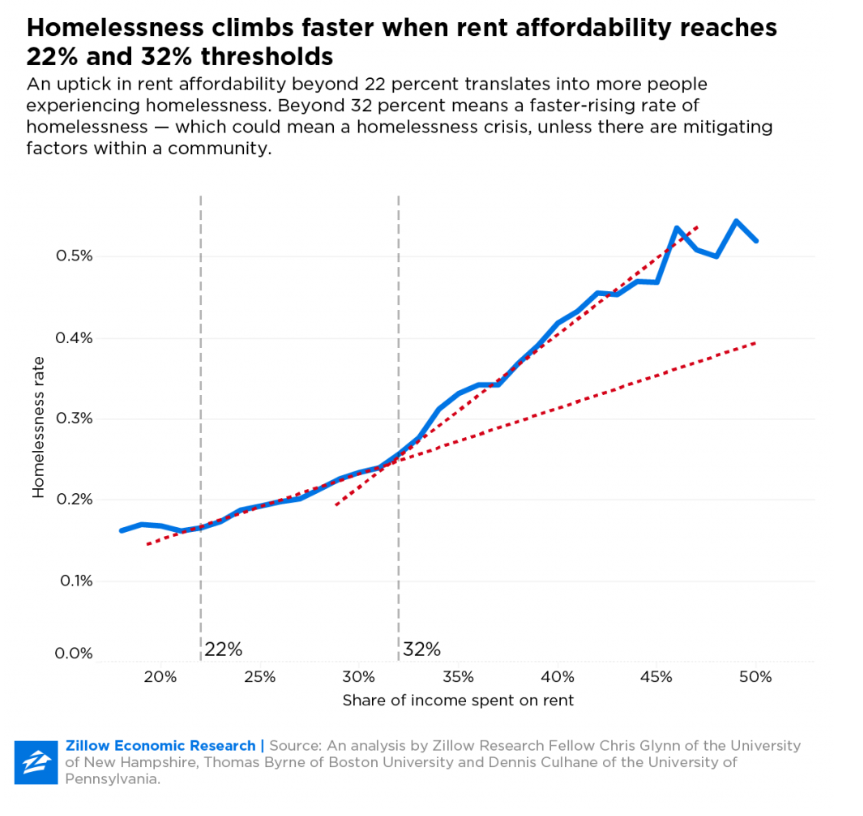This is Joseph.
Twitter has been discussing homelessness after the recent Jerusalem Demsas article which really places the blame for homelessness on housing costs and supply. I am not completely convinced that asset inflation and the rise of the REIT has not accelerated an underlying problem, but it is becoming beyond doubt that this is an important part of the picture and one that imposes enormous social costs.
Homelessness and rent affordability.
The inflection point in this graph is alarming. It is clear that zoning in Canadian cities, for example, favors detached housing (60% of the area of Toronto) which limits the ability of the market to build enough housing.That said, I am not sure that this criticism is really well aimed:
The small-c conservative belief that people who already live in a community should have veto power over changes to it has wormed its way into liberal ideology. This pervasive localism is the key to understanding why officials who seem genuinely shaken by the homelessness crisis too rarely take serious action to address it.
I would instead tend to say that it is the elites in these locations that are important; few people in poverty are going to be upset that house prices are not going up. Instead it is the need to appeal to middle class homeowners that is the issue. And, honestly, this suggests that a lot of the solution is to push the decisions about zoning much further up the political ladder. We see some early signs of this in California.
The truth is that we need to stop worrying about preserving neighborhood character and accept that things change. Here is Ken White talking about losing an online space he had once valued. It is the same for cities. All of places I loved when I first lived in Seattle are gone (university village Barnes and Noble, Half price books, Bauhaus cafe, Wayward Coffeehouse, Northgate mall, The Dreaming comics) and that is with the keeping of single family zoning. Living places need to grow, evolve, and change.
I just hope we can allow the growth before the homelessness crisis gets any worse.

«Instead it is the need to appeal to middle class homeowners that is the issue. And, honestly, this suggests that a lot of the solution is to push the decisions about zoning much further up the political ladder.»
ReplyDeleteIndeed what for some people is a housing crisis is for other people a housing boom that has made them much richer, thanks to rapidly rising prices for the real estate they own, and they will donate to and vote for politicians who continue to deliver to them those rapidly rising prices.
But that means that moving zoning up the political ladder won't have much effect: which politician is going to risk donations and votes by the middle class by reducing their real estate profits?
Also rapidly rising housing prices are the basis of the enduring electoral popularity of "neoliberalism": the middle class support policies to push down wages and public services only as long as there are policies to push up real estate prices. In other words it is not just the middle class who are invested in keeping real estate booming, but also corporate and finance leaders, who benefit hugely from neoliberal policies.
The other point is that not only there is a big and powerful political coalition that benefits directly or indirectly from booming housing costs, but also that zoning is not the issue, and the papers that I keep seeing to this effect are rather misguided, because what drives up real estate costs is not so much scarcity of housing supply, but overabundance of jobs in certain areas, because most people don't in some place "just because", but to be near jobs.
House prices in Silicon Valley are very high not so much because there is a scarcity of housing supply, but because there is a ridiculous concentration of well paying jobs there. Conversely in large parts of the country, where jobs are scarce, housing costs are quite low, as few move there.
Professional real estate speculators use a simple metric: ratio of new job openings to new houses built for an area. The latter is far more important because both mortgages and rents are paid for by the income from jobs.
Some relevant quotes:
A commenter on "The Guardian": «I will put it bluntly I don't want to see my home lose £100 000 in value just so someone else can afford to have a home and neither will most other people if they are honest with themselves»
Bloomberg: «From the minute the average couple buys a home they're constantly calculating how much they'll make when they sell it»
«a simple metric: ratio of new job openings to new houses built for an area. The latter is far more important»
ReplyDeleteOops, I meant "The former", "new job openings". Also because it is much easier to move "good jobs" from congested to uncongested areas than to increase housing supply in congested areas. Except that government policies also, to help increase real estate prices in congested areas, often spend fortunes to keep (e.g. with bailouts) or increase "good jobs" in areas that already have them.